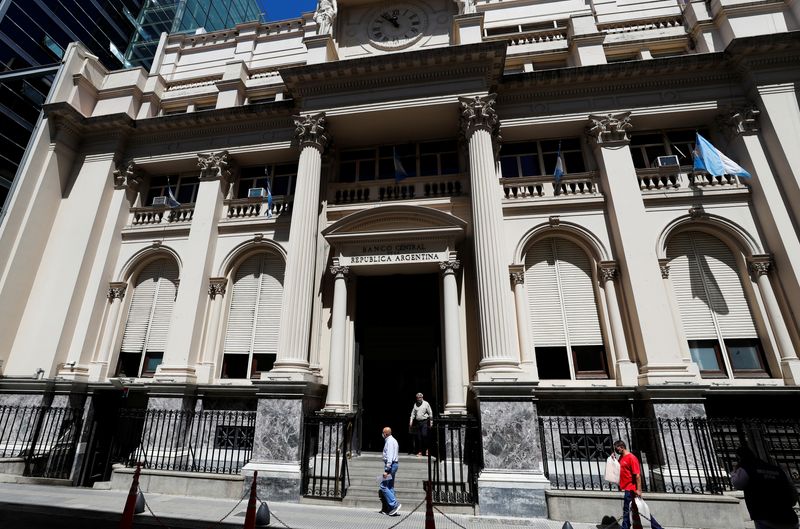By Walter Bianchi
BUENOS AIRES (Reuters) - Argentina's economic alarm bells are ringing loudly with fears of a global recession and spiraling inflation stoking investor fears over possible defaults, missed targets with the International Monetary Fund (IMF) and political unrest.
The South American country, an important global supplier of soybeans, corn and wheat, has seen its bonds sink to record lows, pressure on its peso currency is rising and a high energy import bill is stopping it building up vital dollar reserves.
Domestic inflation meanwhile is heading towards 70% by the end of the year, forcing the central bank to tighten monetary policy hard, risking growth. The interest rate has climbed to 52% in a bid to avert investors dumping peso assets.
With grains exports dipping in the second half of the year, this could imperil the country's ability to meet targets linked to a $44 billion deal agreed with the IMF.
"The government is finding it increasingly hard to renew all maturities and there is a growing fear of it resorting to a reprofiling of its debt," said Víctor Beker, director of the Center for New Economy Studies at the University of Belgrano.
Argentina's economy, the third biggest in Latin America, has been hit by crises, defaults and rampant inflation for decades.
The recent volatility has been exacerbated by wider emerging market jitters as the U.S. Federal Reserve has tightened monetary policy and soaring global prices, including high energy costs that have badly hit Argentina's balance of payments, limiting its ability to build up much-needed foreign reserves.
BONDS IN THE 20S
Argentina's sovereign bonds, restructured in a huge $110 billion deal in 2020, have tumbled back into distressed territory, with many now worth just 20-30 cents on the dollar, a reflecting of perceived default risk.
"Without access to the capital markets, Argentina is going to have to restructure again and again," said Gabriel Torres at rating agency Moody's (NYSE:MCO). The government last week held a massive local debt swap to push back payments for June.
"And the only way for it to have access to the capital market is if the market believes that Argentina is really willing to pay its debt."
Argentina's U.S. dollar bonds https://graphics.reuters.com/ARGENTINA-ECONOMY/DEBT/zgpomaegjpd/chart.png
PESO GAP WIDENS
Tight capital controls have created popular alternative currency markets, where dollars trade at prices far removed from the official rate. The gap has recently started to widen again amid concerns over the economy and tight financing.
That gap with the official rate has widened to around 100%, a destabilizing disparity rooted in controls which limit how much each person can buy every month to some $200.
"An FX gap as wide as the current one not only affects the behavior of price setters but also the incentives of exporters and importers, which reinforces expectations for a forced macroeconomic adjustment down the road," J.P. Morgan said in a note.
Argentina's double dollar https://graphics.reuters.com/ARGENTINA-ECONOMY/akvezloqqpr/chart.png
INFLATION HEADS FOR 70%
The country, which has long battled rising prices, now has the second highest inflation among major economies behind Turkey. The rate was at 60.7% in May and a central bank poll forecasts it will hit $72.6% by the end of the year.
That's far above targets agreed with the IMF of 38%-48% and weighs on salaries, savings and investment. Government officials have already hiked the official inflation target to 52%-62%, though most analysts see it well above that range.
"For 2022 we project inflation of 75%, and there are upward risks," said Isaias Marini at consultancy Econviews.
Argentina: inflation spirals https://graphics.reuters.com/ARGENTINA-ECONOMY/zgpomndbrpd/chart.png
DOLLAR RESERVES
Argentina has been struggling to build up its foreign currency reserves, key to meeting future debt obligations and a central part of its agreement with the IMF. Gross reserves stand at some $41 billion but net reserves are far lower.
According to the IMF, net international reserves stood at $2.3 billion at the end of 2021. The target is to raise that by $4.1 billion by end June and $5.8 billion this year. Net increases to date are $960 million, Reuters calculations show.
The central bank, which does not regularly publish its net reserve levels, declined to comment.
"Everything seems to indicate that the government will not be able to meet the goal agreed with the IMF in terms of reserve accumulation," said Beker.
Reserves dwindle https://graphics.reuters.com/ARGENTINA-ECONOMY/egpbkoralvq/chart.png
This, however, could get worse before it gets better, pushing the government towards higher taxes and controls.
"We're likely to see measures that imply a greater outlay from the private sector to the State," said Gustavo Martin, an analyst at investment platform Balanz.
"That is to say new taxes and higher tariffs, along with policies of greater restrictions on access to foreign currency."
<^^^^^^^^^^^^^^^^^^^^^^^^^^^^^^^^^^^^^^^^^^^^^^^^^^^^^^^^^^^
Argentina's U.S. dollar bonds (Interactive graphic) https://tmsnrt.rs/3FzHvdH
Argentina's U.S. dollar bonds https://tmsnrt.rs/3fz89Zs
Argentina: inflation spirals https://tmsnrt.rs/3pWg2Ne
Argentina: inflation spirals (Interactive version) https://tmsnrt.rs/3s8mjZ7
Reserves dwindle https://tmsnrt.rs/33FZ7XQ
Reserves dwindle (Interactive version) https://tmsnrt.rs/30OwTsS
Argentina's double dollar https://tmsnrt.rs/3zXEJ2y

Argentina's double dollar (Interactive version) https://tmsnrt.rs/3HFqAsJ
^^^^^^^^^^^^^^^^^^^^^^^^^^^^^^^^^^^^^^^^^^^^^^^^^^^^^^^^^^^>